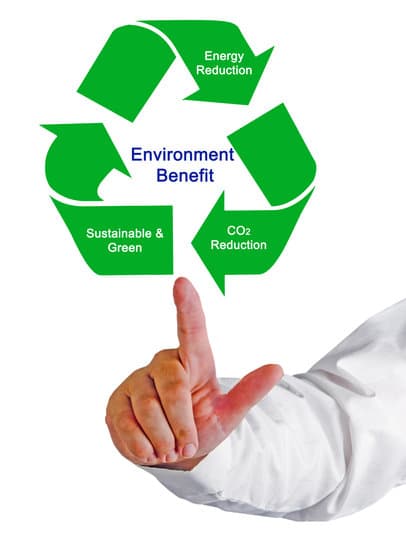There’s little doubt that consumers care deeply about the environment and sustainability, and prefer to deal with businesses which care about these things too. According to a recent survey conducted by Accenture, a leading global management consultancy, 60% of respondents said that since the start of the COVID-19 pandemic they were making more environmentally friendly, sustainable or ethical purchases.
A societal shift towards making better environmental choices had begun well before the pandemic took hold and it is accelerating now that the world is returning to normal.
But what will this shift mean for SMEs, and what, in practical terms, can businesses do to operate more sustainably? To answer these questions we first need to step back and consider the definition of sustainability:
“The quality of not being harmful to the environment or depleting natural resources, and thereby supporting long-term ecological balance.”
It sounds pretty straightforward, doesn’t it? The widely held view is that the benefits for SMEs of moving to a more sustainable way of operating will be very significant over time.
So here’s a roadmap for SMEs which are just starting out on their sustainability journey and some useful resources to help speed things along.

Company Mission
The first step…and a crucial one. The mission statement of a business should reflect its values. If a company is serious about sustainability, its mission statement should include commitments to practice social and/or environmental responsibility – to practice good stewardship of the environment and to have a positive social impact.
Some businesses may decide to target a particular beneficiary group in need of support (in society or in the environment). They will outline a commitment to serving this group in the mission statement.
Here is some guidance from the Green Business Bureau on How to Create the Perfect Green Mission Statement.
Action Plans and Targets
To make sustainability a priority within every element of a company’s operations, how it will achieve this needs to be incorporated into business strategies. Appropriate goals need to be set. This requires action plans, with targets which include measurable results. Remember the old adage…if you can’t measure it, you can’t manage it!
Employees and management will need to be held to account for their performance in meeting the sustainability goals of the business. And there’s no room for any let-up. Momentum has to be maintained over the long term in order for sustainability goals to be achieved.
Encourage Everyone at the Company to Buy In
Employees at all levels need to understand how their individual efforts really can make a difference to the environment, Most businesses will have to invest some time and effort to educate and train their employees on what operating sustainably means in practice. Once broad buy-in has been achieved, and employees can see that what happens at their place of work has benefits, even in a small way, for the whole planet, they will quickly become powerful advocates for change.
Employees will probably have lots of ideas of their own about resource conservation. They will observe on a daily basis where there is waste or where things are happening within the business which may not be good for the environment. A communication channel should be set up so that these ideas can be received and considered, prior to their possible implementation. But don’t make this an overly bureaucratic process! And make sure the best ideas are suitably rewarded.
For more information on training and educational resources for businesses which are interested in the environment and sustainability, a good place to start is The Institute of Environmental Management & Assessment.
Create Green Work Spaces
In offices and indoor work environments it’s always a good idea to have a selection of plants. Not only will they help to clean the air, but they will also make work spaces look more attractive and improve the general mood. Wherever possible, ensure that natural light is maximised.

Do More Online
Holding meetings online and arranging conference calls, instead of having physical meetings, helps to reduce pollution and saves any business a good chunk of money on travel.
Sending out paper reports, documents and invitations should be a thing of the past as everything can be done online. The same goes for sending direct mail – this is expensive, outdated and wasteful. Move all your promotional activity into the digital realm and embrace social media – this will get you far more traction.
Conserve Water and Electricity
There will be opportunities at many business premises for relatively simple changes to be made which will result in improved resource conservation. Installing energy-efficient toilets, taps, hand-dryers and lighting are all great ways to save water or energy.
Use heating and/or air-conditioning systems only when needed and consider installing automatic lights in appropriate locations. Another good idea is to establish a water saving system so that rainwater can be collected and filtered for use in the office.
When purchasing new office equipment, aim to buy energy-efficient models, and when these are in use, the most environmentally-friendly settings should be applied.
Reduce, Reuse, Recycle
Well-run businesses will ensure that a culture of recycling is fostered. A lot of the products used at business premises can easily be recycled – including waste paper, electronics (including computers and monitors), printer cartridges, light bulbs and batteries.
Around the office, make sure that recycling bins are in use and encourage employees to print documents double-sided. Disposable coffee cups can easily be replaced by reusable mugs. All eating utensils used in staff canteens should also be reusable. Efforts should also be made to compost appropriate food waste.

Many SMEs use waste management companies to remove and dispose of their waste – these companies can be very useful partners in helping to set up recycling programmes, so talk to them about it.
Packaging and Shipping
If the business ships products to consumers, introduce eco-friendly packaging, such as bio-degradable mailing pouches, recycled cardboard and compostable bags.
If it is possible to use biodegradable packaging, the planet will thank you for doing so. Single-use containers should be eliminated and replaced where possible with containers that break down quickly and do not damage the environment – containers made from corn starch, mycelium, wood pulp or seaweed for example.
Here are some of the top biodegradable packaging companies.
In the realm of shipping practices there is much that businesses can do to reduce their carbon footprint, while at the same time reducing costs. A focus on sustainable delivery methods will pay handsome dividends. There’s no point shipping a tiny package in a box five times its size. Using compact packaging reduces the amount of space your product takes up, and that means fewer lorry or plane journeys, hence lower emissions.

Supply Chain
It is increasingly important for businesses to understand more about all the companies in their supply chain. The process can be formalised by conducting regular supplier audits. This would examine their corporate policies to see whether they are operating responsibly and would establish whether or not they are suitably accredited and compliant with all relevant regulations in your industry.
Preference should be given to suppliers which are known for their commitment to operating sustainably. In fact, businesses would be well advised to steer well clear of companies which do not operate sustainably, because sooner or later dealings with such companies could bring unexpected trouble – in the form of complaints from customers or negative coverage in the media.
When new contracts are negotiated with suppliers, businesses should make clear their expectations around sustainability at the outset. If you need any help evaluating the performance of your supplier network when it comes to transparency and sustainability practices, a good place to start is EcoVadis.
Purchasing
Another matter to consider is how supplies are sought – is the company purchasing in an environmentally friendly way? For example, are purchases consolidated into a few large orders rather than lots of smaller, more frequent ones? Do you insist on your supplies being shipped in or made from environmentally friendly materials?
Buy Locally
Easier said than done, but if businesses take a conscious decision to buy locally-made products, wherever possible, this will considerably reduce transport and energy costs. Supporting local vendors helps to keep money circulating within the local economy.
If you support small local businesses which share the same ethical values as your company, not only will the local community benefit but company employees will feel good about it.
Chemicals
Hardly a day goes by without new revelations about the negative effects of chemicals that are in daily use. Businesses should ensure that only green cleaning products are used at their premises. If cleaning of the business premises has been outsourced to a professional cleaning company, make sure you know what products they are using and ask them to prove their green credentials.
For any pest-control or garden maintenance work around the site, only non-chemical products should be used.
Where chemical products are in use at the company, because there is no viable alternative, vendors of the products should be requested to train employees on the proper use and disposal of these.
Here is some helpful information from the UK Government if you need to dispose of chemicals.
Implement Sustainability Work Policies
To reinforce the commitment of the business to operating sustainably, it is important that that this commitment is enshrined throughout the company’s policies and procedures.
Employees need to know, for example, that (most) office equipment should be powered down at the end of the day and that energy-saving settings should be applied when they use office laptops or desktop computers.
Any business which offers a flexible working policy for its employees is taking a big step towards sustainability. Working from home brings benefits both for employees and for the environment – a happier and more productive workforce and a reduction in the carbon emissions which would normally be produced on their commutes to and from work.

Businesses should explore whether it is possible to organise a communal transport to work scheme, perhaps by investing in a company minibus. Such schemes are generally a win-win because they are beneficial for the environment as well as fostering camaraderie among employees, improving punctuality and reducing absenteeism.
Other ideas to consider are car-share schemes, incentivising the use of public transport or taking action such as installing a secure bike storage facility to encourage more people to cycle to work.
Charitable Contributions
For any well-run business the benefits of making contributions to charity are obvious, and can be significant. Employees, and the general public, like to see businesses offsetting their environmental impact through activities which will benefit it. Donating a percentage of company profits in support of environmental protection projects generates a feel-good factor.
Other initiatives, such as setting up fundraisers in partnership with the local community to support tree planting, litter-picking, recycling activities or other eco-conscious projects are all beneficial.

Showcase the Sustainability Credentials of Your Business
If your business is already a long way into its sustainability journey, don’t be shy to talk about it. Let everyone know! If you’re proud of the eco-friendly credentials of your business, make sure the message is clear on your website, on all your packaging and across all your marketing channels.
Is There Any Downside?
No! There really is no downside to acting sustainably – it’s good for business, good for the planet and your customers and employees will welcome your commitment.
SMEs which operate sustainably will generally benefit from an improved brand image. A strong brand usually opens the door to greater investment opportunities, as well as making the company a more attractive employer.
Bishopsgate Copywriting is committed to operating as sustainably as possible. To read about our sustainability journey, click here.



